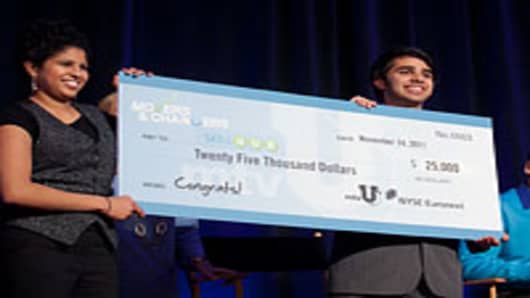The room erupted in applause, not just for the opening bell to commence trading on the floor of the New York Stock Exchange, but for the promise of next generation entrepreneurs.
Competing in the nationwide “Movers & Changers” competition, launched by NYSEand mtvU, the fresh-faced finalists will leave the trading floor with $25,000 in start-up money, and instant name recognition – at least among the other 149 contestants who didn’t make the cut. And the winner is...a new website.
But not just any website. "Skillhub" is the brainchild of two University of Pennsylvania seniors who both happened to intern at Google. .
Their idea, they say, was a mutual ah-ha moment.
"When Sushanth told me on Skype about his video-sharing website idea, I said hold on, and sent him an email of mock designs of a website — it was the exact same idea," said Karishma Shah of her now partner Sushanth Bhaskarabhatla.
The website, comparable to "indirect" competitors Ebay or Craigslist, will instead specialize in tutoring skills, and expand what are typically localized connections to worldwide access.
Serendipity, in this case, is backed by careful planning. "Some skills are saturated markets, like language. We're not doing that," said Bhaskarabhatla. "There is a demand for niche skills, which are really not captured by traditional platforms."
"My brother wanted to learn how to program iPhone apps in a week," added Shah. "He needed a personal tutor. It's not something you can get on a website tutorial."
While today's win is a game changer for celebrating students, their judges — a panel of three successful, seasoned entrepreneurs— offered sobering advice.
"The easy part is the idea. You’re all pumped up. The hard part is the execution," said Mark Cuban, Chairman of HDNet and owner of the Dallas Mavericks.
For all of today’s optimism, set to MtvU's hip-hop background music, the fact is these students will be entering an extremely competitive landscape dependent on a lackluster economy.
Another judge, Alexandra Wilkis Wilson, co-founder of online luxury goods retailer Gilt Groupe, also offered tempered advice: “Seek out people who will tell you your idea is a bad idea. There are probably elements of your business model you haven’t thought out. If you can anticipate naysayers, you can use that to your advantage."
The weight of Wilson's words is unintentionally illustrated. Gilt Groupe has yet to turn a profit in five years operation. The company has been able to count on inventory from luxury brands who were willing, during the recession, to sell their products at a deep discount. It is unclear, however, if luxury brands will continue to do this as the economy improves.
At the same time, new markets are born every day, as supply meets demand. And the mantra from the judges is positive, and simple: avoid banks, who aren't lending anyway, and find a way to do it yourself.
"All the businesses I started, [I did] without raising a lot of money," said Cuban. "Sweat equity is your time. The minute you take other people’s money, the stakes are different. You have a lot more leeway with your time, and your sweat equity, as opposed to someone else’s cash.”
Do the students buy this line of logic? "With $25,000 we can start the website. We can do a beta launch, and test out our first round of customers. We're avoiding the banks," said SkillHub's Shah.


